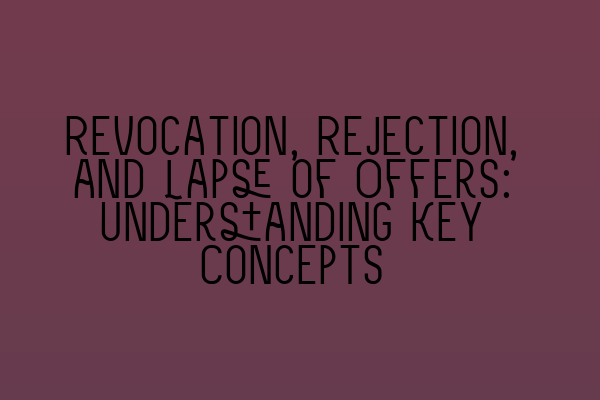Revocation, Rejection, and Lapse of Offers: Understanding Key Concepts
As a solicitor specializing in contract law, I often come across various intricacies surrounding the formation of contracts. One crucial aspect that clients often seek clarification on is the revocation, rejection, and lapse of offers. Understanding these key concepts is essential to navigate contract negotiations successfully. In this blog post, we will delve into each concept, shedding light on their significance and practical implications.
Revocation of Offers:
The revocation of an offer refers to the act of the offeror taking back or withdrawing their initial proposal before it is accepted by the offeree. In simpler terms, it is the offeror changing their mind and retracting their offer. Revocation can only occur if it is communicated to the offeree before they have accepted the offer.
It is crucial to note that a valid offer can be revoked at any time before acceptance, except in specific circumstances where the offer is irrevocable. Common scenarios where an offer is irrevocable include options contracts, unilateral contracts, or when an offer is supported by consideration.
For example, if you receive an offer from a potential client to purchase your consultancy services, you must be aware that the offer can be revoked by the client until you formally accept it. Therefore, it is essential to act promptly when considering offers and ensure timely acceptance to avoid any revocation.
Rejection of Offers:
Rejection, on the other hand, occurs when the offeree explicitly declines or refuses to accept an offer. It is crucial to understand that the rejection of an offer terminates the offer, making it no longer valid. Once rejected, the offer cannot be accepted later, effectively closing the door on the opportunity to enter into a contract on the original terms.
It is important to note that if an offer is rejected, the offeror is no longer bound by the original terms and may choose to make a new offer or withdraw altogether. Therefore, it is essential for both parties to clearly communicate their intentions to avoid any misunderstandings or confusion.
For instance, if you receive an offer from a potential supplier to provide goods for your business, and you reject the offer due to unfavorable terms or pricing, the supplier is no longer bound by the original offer. They may choose to present a revised offer or explore alternate business opportunities.
Lapse of Offers:
The lapse of an offer refers to the expiration or termination of an offer before it is accepted. An offer can lapse in several ways:
1. Time-based lapse: If the offer specifies a time limit for acceptance, it will automatically lapse if not accepted within that timeframe. However, if no time limit is specified, a reasonable time period will be implied, and the offer will lapse if not accepted within this reasonable duration.
2. Revocation lapse: As discussed earlier, an offer can lapse if the offeror revokes it before acceptance. Once the offeree is notified of the offer’s revocation, the offer ceases to exist.
3. Rejection lapse: Similarly, if the offeree rejects the offer, it lapses and cannot be accepted later. The rejection terminates the offer.
4. Counteroffer lapse: If the offeree responds to the offer with a counteroffer (suggesting different terms), the original offer lapses. The counteroffer is considered a rejection of the initial offer, creating a new negotiation process.
5. Death or incapacity lapse: In some cases, if either the offeror or offeree dies or becomes incapacitated before acceptance, the offer automatically lapses. However, if the offer is irrevocable and supported by consideration, it may remain valid in certain circumstances.
Understanding these various scenarios of offer lapse becomes crucial when negotiating contracts or making business deals. Being aware of when an offer lapses can help manage expectations, facilitate efficient negotiations, and avoid potential disputes.
In conclusion, revocation, rejection, and lapse of offers are key concepts that hold significant implications in contract law. As a solicitor, it is essential to inform and guide clients on these concepts to ensure their contract negotiations proceed smoothly. For businesses and individuals engaging in contractual discussions, understanding these concepts is vital to protect their interests and ensure clarity throughout the negotiation process.
If you require further assistance or legal advice regarding revocation, rejection, or lapse of offers, do not hesitate to reach out to SQE Contract Law. Our team of expert solicitors is here to support you through the legal complexities and help you make informed decisions.
